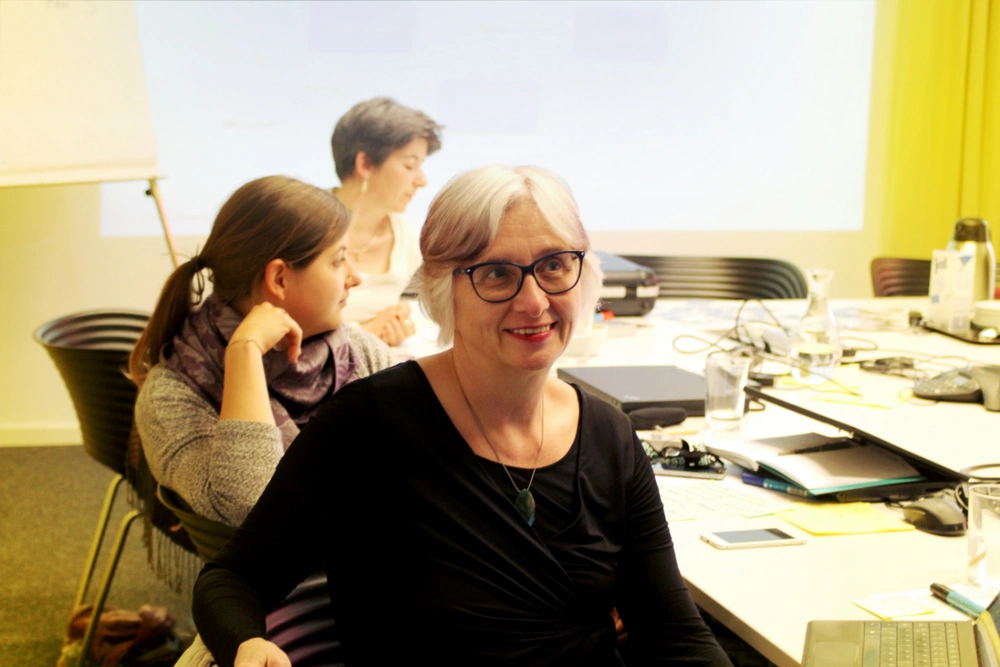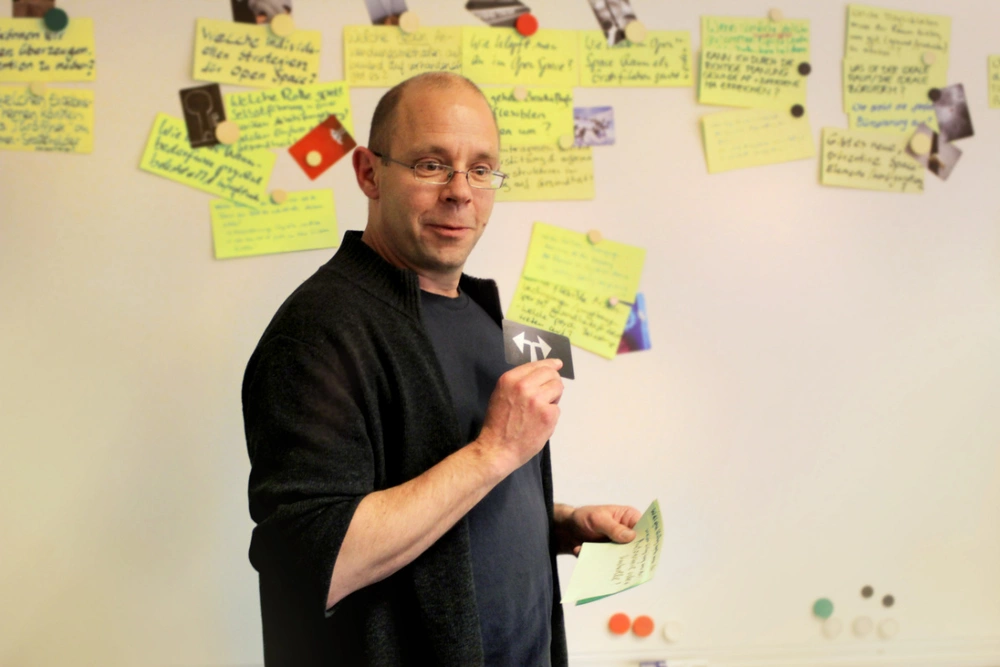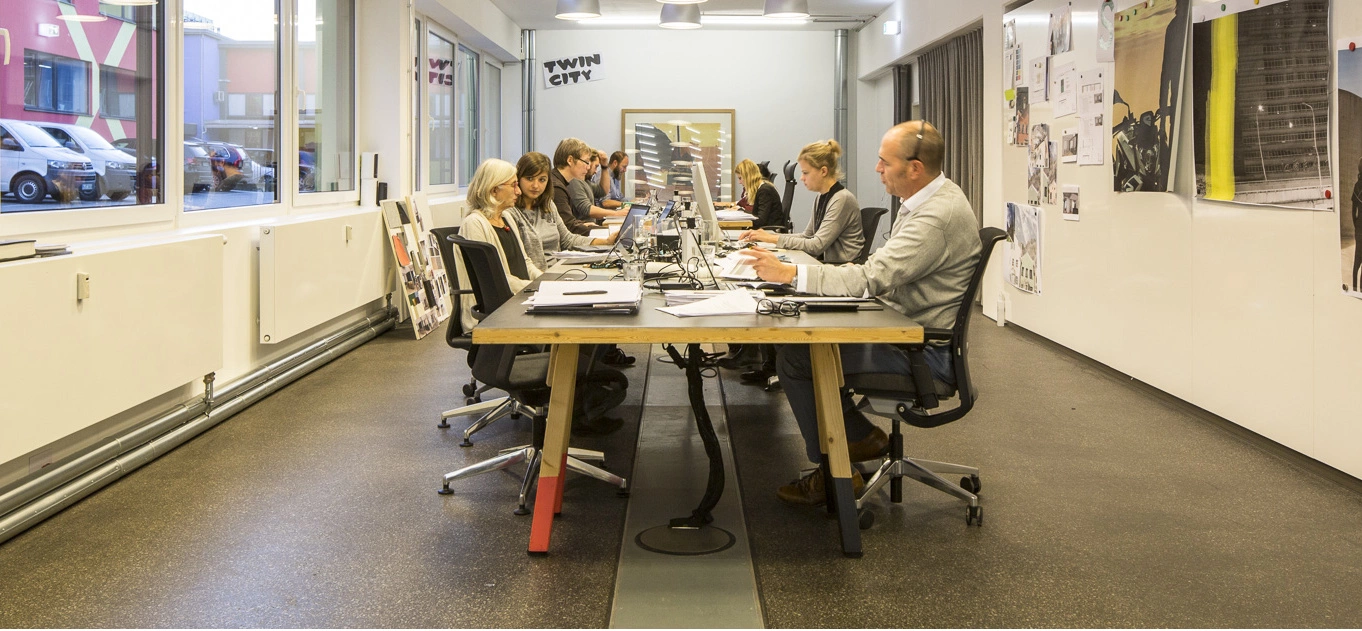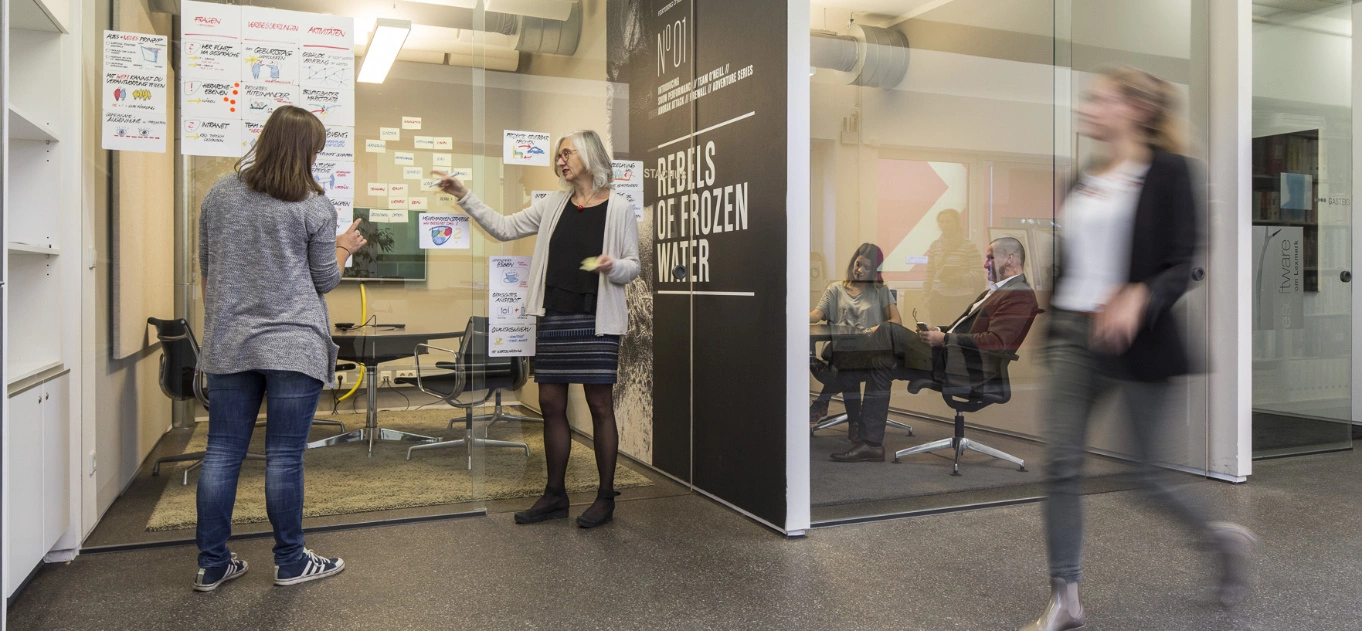WELL-BEING IM OPEN SPACE
More and more people are working in open space office environments these days, without an individual office or even a desk of their own. What they do have, however, is a variety of workspaces at their disposal, such as teamwork areas, rooms for socializing, quiet corners to retire to, or an open-work area. Opponents of open space offices argue that this type of office layout causes stress for employees, due to for example, increased noise volume and a lack of privacy. Is this really the case, though? How, in fact, are open space offices perceived by their users? What does a person need to ensure his or her well-being is being in an open space office? And most importantly, how can organisations implement an open space office environment to actively promotes employee well-being?
These were the main considerations occupying the German transdisciplinary research project “PräGeWelt” – an abbreviated name that stands for the “prevention-oriented design of new (open space) work environments”. For three years (2016-2019), RBSGROUP worked together in collaboration with ISF e.V. (the Institute for Social Science Research in Munich), the University of Freiburg and AECOM Munich to find answers for research and practice. This involved the examination of open space offices and the interplay between organisation, space, work and individual well-being.
The project was funded by Germany’s Federal Ministry for Education and Research (BMBF) within the program 'Innovation for Tomorrow's Production, Services and Work' and managed by the Project Management Agency Karlsruhe (PTKA).
EMPIRICAL BASIS
Trend analysis // 18 companies, expert interviews, online survey
Case studies // 8 companies, online survey, interviews, observations
Tool development // 5 companies; development, testing and evaluation of guidelines and tools
The combination of research into different open space office concepts, the appraisal of specialist literature and the many years of experience gathered by partners RBSGROUP and AECOM showed that well-being in the workplace can only be achieved with a holistic approach. The key to an open space office that is conducive to good health is, in addition to the architecture, the integrative consideration of organization, team (or open space user community) and individual.
SCIENTIFICALLY ESTABLISHED PRACTICE GUIDELINES
Guideline 01 // Open space is a process
PräGeWelt’s research revealed that open space is more than a spatial concept: it is a dynamic organizational concept that requires continuous evaluation. Space and organsiation must be equally flexible and work well together. In practice, this means adressing organisational culture (e.g. leadership culture, home-office). The support which users receive when moving into newly designed offices should, in fact, continue after the move. After all, the change in organizational culture often takes longer than the construction of a new workspace.
Guideline 02 // Open space is a "field of tension"
This is something that the results of the PräGeWelt project made clear: Every open space has a “field of tension” between concentration and cooperation, confidentiality and openness as well as individuality and flexibility. More of one element automatically means less of the other which creates a dilemma. These “areas of tension” cannot be resolved, instead only be balanced. Regular attention must be paid to the awareness and balancing out of various needs and concerns within the whole user community. This underscores the importance of post-relocation measures (see workshop tool “Balancing Act Open Space”).
Guideline 03 // Open space "has to be learnt"
Using a space that fits the activity you perform is the idea behind open space offices. However, PräGeWelt has discovered that people who have carried out their work at the same place, and for a long period of time, often have difficulties adjusting to new environments with flexible options for using space. Individuals first have to learn how to use their new environment and adapt, step by step, to working in it. Only then can an open space office concept realise its full potential. The self-reflection tool shown below can help an individual to address his or her own workspace utilisation.
TOOLS AND WORKSHOPS
What do these guidelines actually mean? How can practioners align or 'balance' the different needs within a user community? How do individuals learn to use the open space offices to meet their workplace and well-being needs? The PräGeWelt results underline the importance of change management when implementing the open space office concept. The team devised two tools that can be easily integrated into the change management process and especially suit the post-relocation phase.
Workshop for the user community: "Balancing Act Open Space"
In this workshop, satisfaction of the current use of space is jointly evaluated within the user community and solutions for collective well-being are developed.
Download
Workspace Coaching for the individual: Toolbox "Self-reflection in the open space"
The toolbox “self-reflection in the open space” can help when users are challenged in well using their open space office or feel insecure regarding the new flexible working style. It contains three tools. The main tool “workspace utilisation and resource mapping” asks the workshop participants to analyse their own individual use of space. With a “map” which they create on their own they further identify resources that increase their well-being and develop strategies for better workplace utilisation. Tool number 2 and number 3 can be used for occupational health management, by steering the focus to tackling stress and individual coping strategies. Our research and consulting experience have also shown that User Experience (UX) methods help companies to identify the factors relevant for employee well-being and successful space utilisation.
Download
The following formats have proved successful within open space workplace projetcs:
"Well-being Workshop" for management and executives
In a team, managers work out which levers influence the impact of the open space on employee well-being in their particular context. The participants derive targeted strategic measures and develop ideas on how their organisation can support the success of the new workspace.
"Empathic observation". Comprehensive analysis for better work in the open space
A tool that analyses the existing workplace concept from the user's perspective. The results create concrete suggestions for improvement in spatial design but also on organisational factors that influence workspace utilisation.
Our interdisciplinary team made up of psychologists, architects and interior designers, would welcome the opportunity to advise you in the field of "well-being in open space office environments".


MORE ABOUT NEW WORK IN OPEN SPACE
The PräGeWelt project is a part of the BMBF-funded initiative on “Innovation for Tomorrow's Production, Services and Work”. More information is available on the project’s own website www.praegewelt.de and the online platform https://gesundearbeit-mega.de.
Funding
German Federal Ministry for Education and Research (BMBF)
Project supervision
Project Management Agency Karlsruhe (PTKA)
Institut für Sozialwissenschaftliche Forschung München e.V. - ISF München
Albert-Ludwigs-Universität Freiburg, research group Wirtschaftspsychologie am Institut für Psychologie
München AECOM Deutschland GmbH, München
Duration
01. January 2016 - 31. July 2019
Services
Project partner,
Development of reflection toolbox,
Graphic design of the project
Photos Office Kistlerhofstraße 70
Peter Neusser

